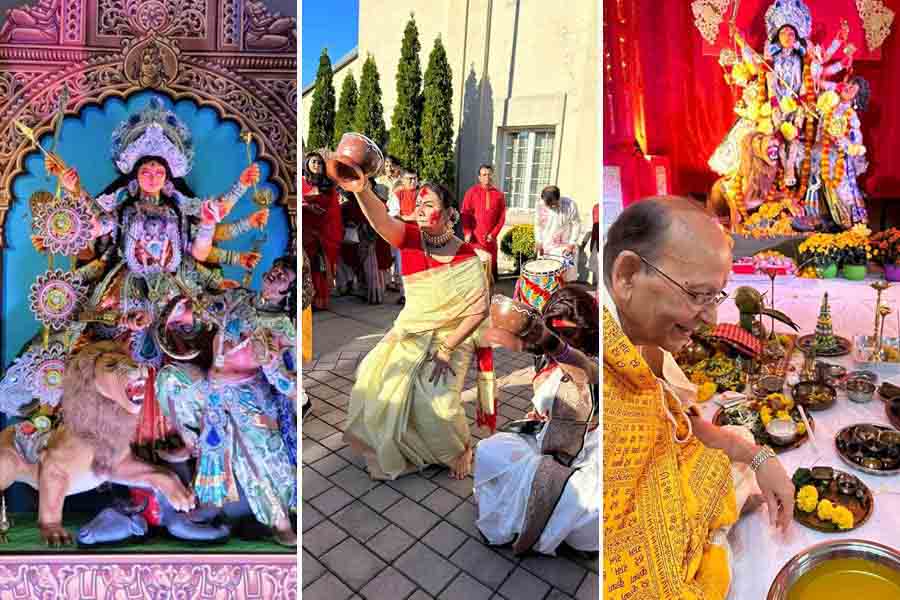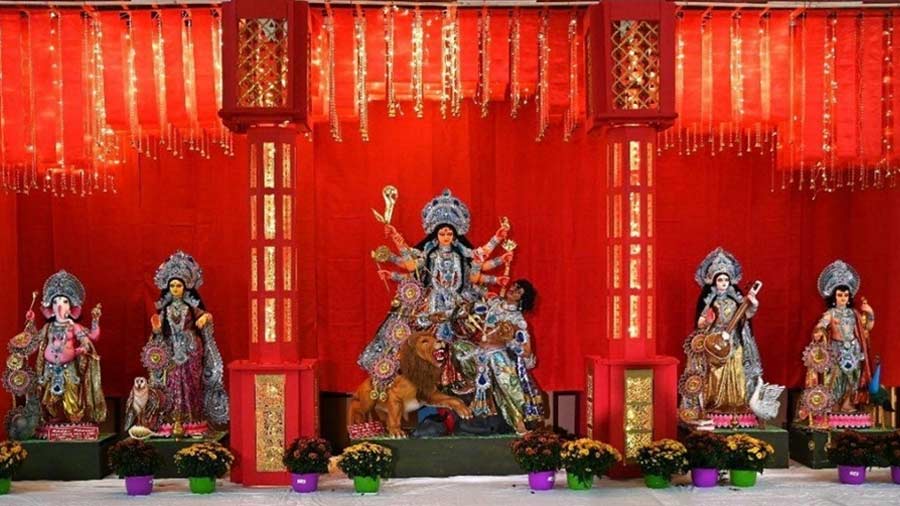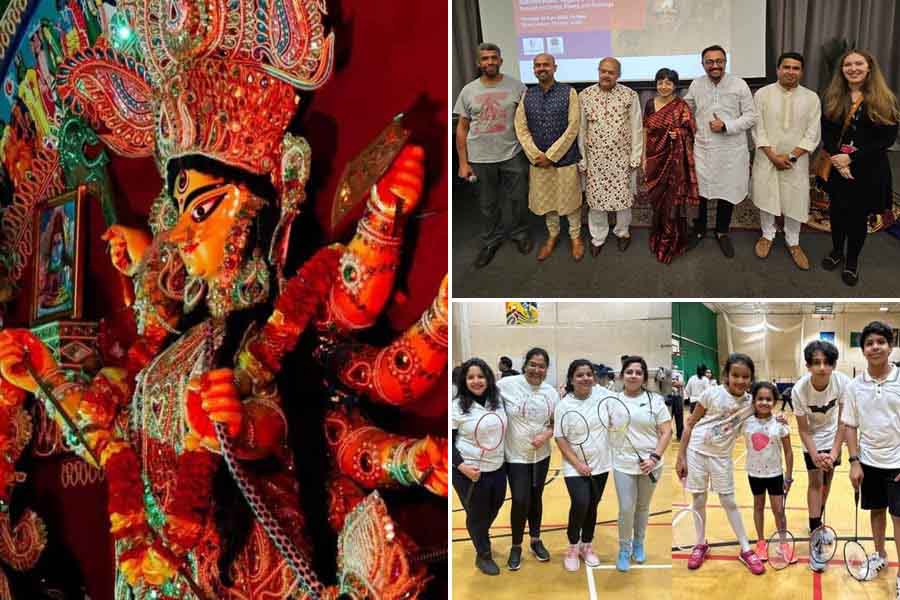“It’s not just a Puja, it’s a cultural experience,” says Pinaki Datta, the president of Kallol of New Jersey, one of the oldest Bengali clubs in the US. This year, Kallol is celebrating its 48th Durga Puja, and its biggest till date: “We’re bringing the joy and festivity of the four-day Puja to the US in 2024, encouraged by the nostalgia we feel for the kind of Puja we grew up with,” adds Datta.
For almost five decades, the Bengali community of New Jersey has been recreating the magic of Durga Puja through Kallol, an organisation that transforms a Ukrainian church into a slice of Kolkata every autumn. This year marks a milestone with the extension of the celebration to four days — a first for any non-religious community organisation in North America. Ahead of Kallol’s biggest Durga Puja yet, My Kolkata delves into the tapestry of traditions, memories and cultural heritage that makes Kallol’s Puja one of the most distinct in the world.
‘Even though Kallol has expanded a lot, it still feels like a family Puja’
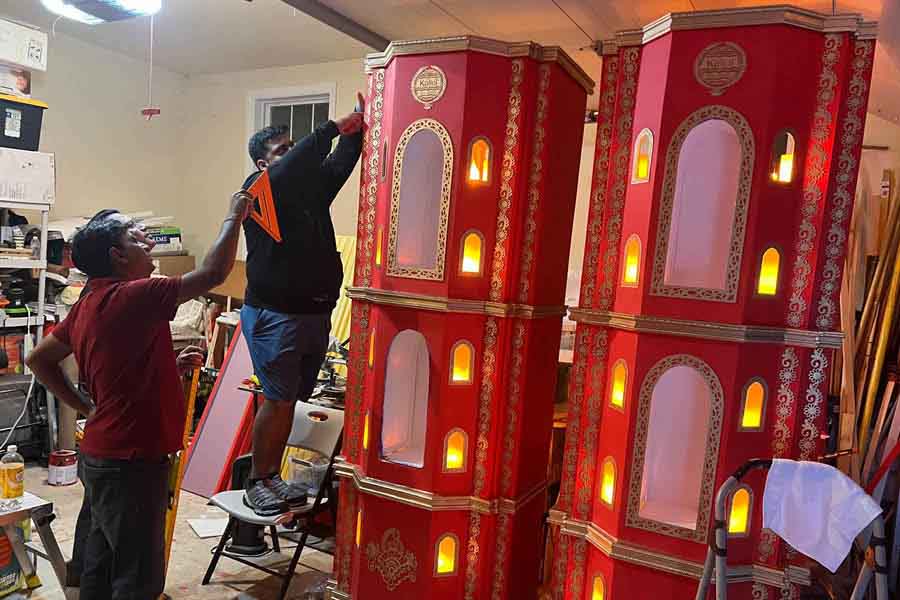
Preparations for Puja underway at the garage of Pratap Aditya Mallick, one of Kallol’s current executive committee members
Kallol began celebrating Durga Puja in 1977. “We started in the Rutgers University Sports Hall (in New Jersey) with 300 to 400 people. Now, we’re celebrating in a huge Ukrainian hall, and our team has grown tremendously. Even though Kallol has expanded a lot, it still feels like a family Puja,” reminisces Alolika Mukhopadhyay, one of Kallol’s founding members. For Datta, the current president, this growth reflects Kallol’s essence: “Kallol’s Puja isn’t just about the festival or the accompanying cultural performances. It’s about everyone coming together and tapping into that familiar Kolkata nostalgia.”
Kallol has been observing three days of Puja festivities for more than 20 years, but this year marks a step up in the celebrations. For the cultural programme, Kallol’s lineup for 2024 includes Babul Supriyo, the Nandy sisters (Antara and Ankita), Madhubanti Bagchi, Sudesh Bhosale and Piyu Mukherjee for the classical performances. Each of the four days is packed with events — photography and children’s drawing competitions, couple contests, raffles and the spirited dhunuchi naach to the beats of the dhaak. “Kallol has also initiated a unique talent hunt programme for children in different age groups, providing an opportunity to them to perform on the main stage of the Kallol Puja,’’ shares Datta.
During Puja, I never feel old or tired. Kallol has been my strength, my family
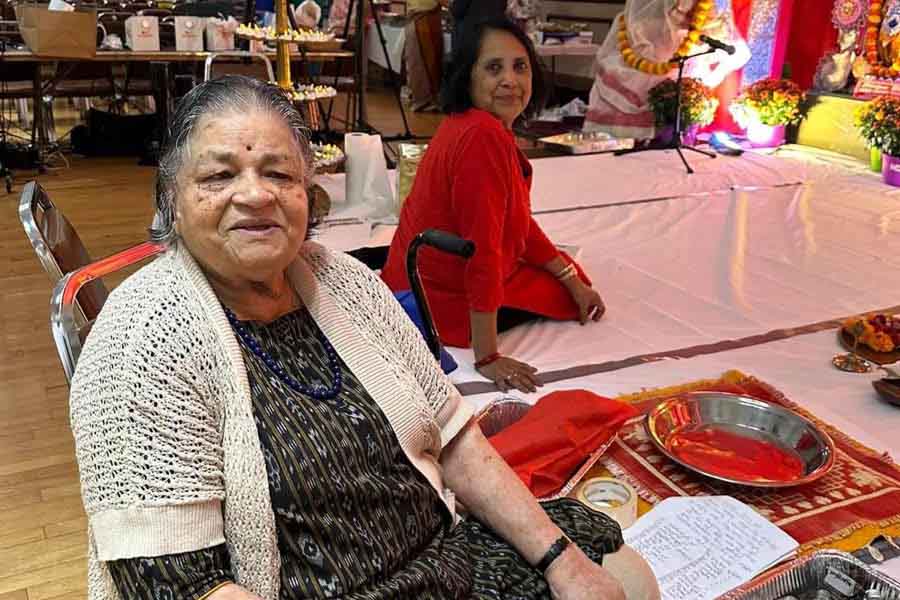
Dolly Chowdhury (left), at 87, remains one of Kallol’s most enthusiastic members during Puja
What sets Kallol apart is its community spirit. Dolly Chowdhury remains one of Kallol’s most dedicated members. At 87, she is still deeply involved in organising the Puja. “People often ask how I manage to wake up early and supervise everything. But during Puja, I never feel old or tired. Kallol has been my strength, my family.”
For younger members like Payal Haldar, Kallol’s Puja is a home away from home. “Even though we’re thousands of miles away from Kolkata, Kallol makes us feel as if we’re still there. It has been nine years since we started attending Kallol’s Puja regularly. Every year, it’s a whirlwind of adda, fun and vibrant festivities.’’
The Ukrainian church’s grand stairway has become an iconic symbol of the celebration, as Ritu Das Datta, a journalist and performer, humorously recounts: “The sight of ladies in saris seated on the stairs, while their husbands strike various yoga poses to capture the perfect picture, has become so popular that someone once asked if we could have separate registrations just for stairway photos!”
Poushali Mukherjee, vice-chairperson of this year's Kallol Durga Puja committee, cherishes the tradition of preparing prasad. Chopping fruits, a seemingly mundane task, has turned into a bonding activity: “We’ve even created a WhatsApp group for it! It’s no longer just about the task, but about the camaraderie, the gossip and the friendly competitions.”
For the members of the Dohar band, Kallol is more than just a venue — it’s a place of love, friendship and support. When Dohar lost their lead singer, Kalika Prasad Bhattacharya, in 2017, Kallol stood by Dohar, even as others wavered. “Kallol believed in us when others didn’t, and for that, Kallol holds a special place in our hearts,” says Dohar’s Rajib Das.
Kallol’s journey mirrors the evolution of three generations of Bengalis in the US
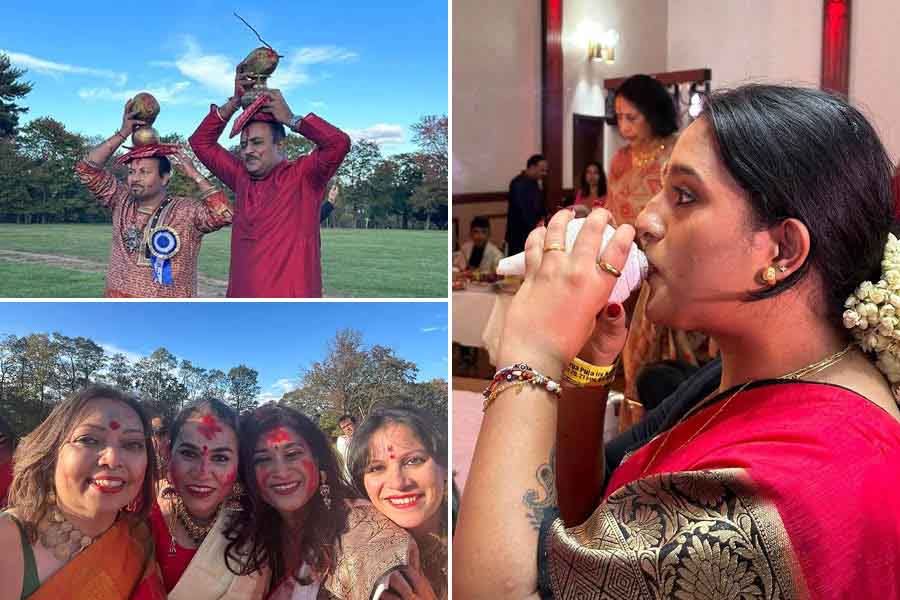
Kallol’s Puja has managed to strike a fine balance between tradition and modernity
On the subject of logistical challenges faced by Kallol over the years, Alolika Mukhopadhyay shares a heartwarming incident about Kallol’s efforts to recreate familiar tastes from back home, recalling the time when a famous music composer requested chingri maachher malai curry: “We didn’t know how we’d pull it off, but we served him Thai shrimp curry with coconut and spices, and he was so pleased… He said he couldn’t believe we could make such delicious shrimp curry in America!”
For many, Kallol is where memories are made and traditions passed down. Poushali Mukherjee remembers bringing her one-year-old daughter in a small red lehenga to her first Kallol Puja. Now, 30 years later, she is expecting her newly married daughter and son-in-law to join her.
This year, while celebrating their cultural heritage, Kallol will also acknowledge the RG Kar tragedy that has rocked Kolkata. “On Navami, candles will be lit and a small gathering to honour Abhaya will be held to show solidarity with protesters back home,” mentions Alolika Mukhopadhyay.
As Kallol’s Puja approaches its golden jubilee, it continues to evolve while staying true to its essence. From the religious ceremonies — the sandhi Puja with 108 lotuses and diyas, the yagna and the sindoor khela — to the cultural performances and community bonding, to a Michelin-star chef’s food stall alongside home-cooked Bengali cuisine, every aspect is carefully preserved and celebrated with the right blend of tradition and modernity.
From its inception through a play to its status as a cultural institution, Kallol’s journey mirrors that of three generations of Bengalis in the US — adapting while remembering, growing while preserving, and always creating a space where Kolkata’s heart beats strong in New Jersey.
